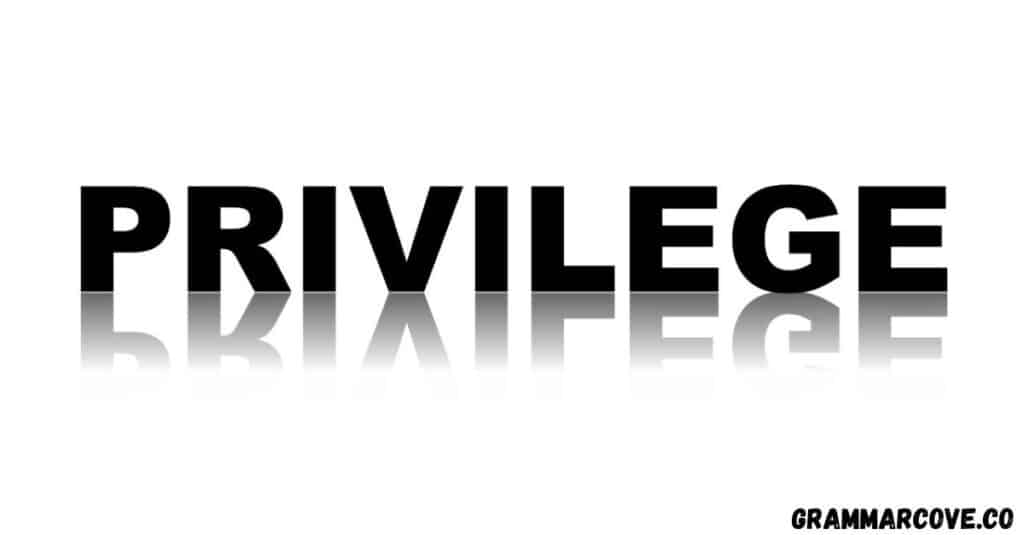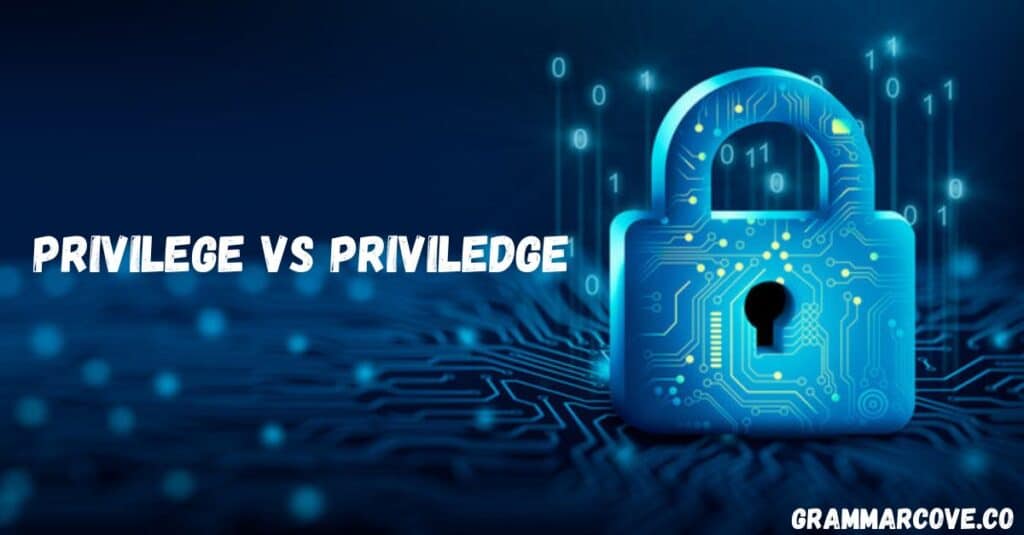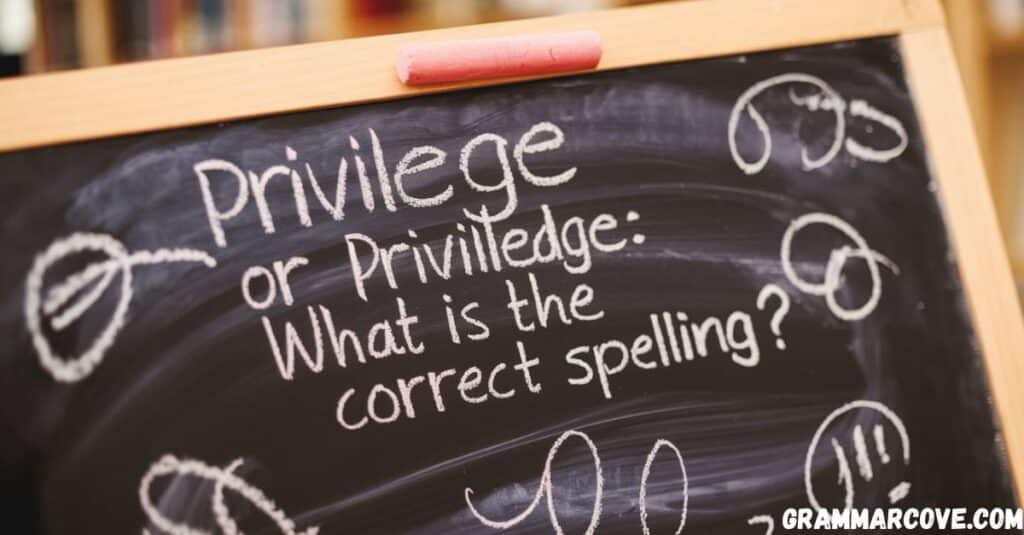Spelling can be tricky in the English language, especially when words sound similar but are written differently. One of the most commonly debated words is “privilege”. You’ve probably come across both priviledge and privilege in various contexts. So, which one is correct? Is it a simple typo or a genuine mistake?
In this article, we’ll explore the correct spelling of privilege, break down its meaning and origin, and provide helpful tips and examples to help you avoid common errors in both professional and personal communication.
What Is the Correct Spelling of Privilege?
The correct spelling of privilege is privilege. You may have encountered the misspelling “priviledge”, but this is not the accurate form. While it’s understandable that people make such mistakes (due to the way the word sounds), it’s essential to use the correct form to ensure your communication is clear and professional.
Privilege vs Priviledge
Let’s break down the two terms:
- Privilege: This is the standard, correct spelling of the word, which refers to a special right or advantage granted to a person or group.
- Priviledge: This is an incorrect, but common, misspelling of “privilege.” People often add an extra “i,” which seems logical because many words in English follow a similar pattern, like “college” and “knowledge.” However, in this case, the extra “i” doesn’t belong.
Privilege Meaning and Origin
Before diving into practical scenarios, let’s take a look at the privilege meaning and origin:
- Meaning: Privilege refers to an advantage, benefit, or right granted to a particular person or group. It often implies something not available to others, usually due to status, wealth, or a particular condition.
- Origin: The word “privilege” comes from the Latin word “privilegium”, which means a law affecting a specific individual or group. It is a combination of “privus” (private) and “lex” (law). Over time, the word evolved to mean any special right or exemption, particularly in the context of social or professional advantages.

Common Misspellings of Privilege
As mentioned earlier, priviledge is a common misspelling of privilege. But there are also a few other variations people may mistakenly use:
- Privlige
- Priviledge
- Privilige
- Privelege
Understanding these common misspellings of privilege can help you avoid mistakes in your own writing. While these errors are frequent, they’re not acceptable in formal or professional communication, so it’s crucial to get it right.
Spelling Rules for Privilege
Here are a few simple rules to help you master the privilege spelling:
- Silent “e” Rule: Many words ending in “ege” tend to have a silent “e” before the “g,” but privilege is an exception. There’s no silent “e” here.
- Double Vowel Rule: Words like “college” and “knowledge” may look similar, leading to the mistaken belief that “privilege” should follow the same pattern. However, the spelling is unique in this case, and it should be “privilege,” not “priviledge.”
- Endings: The word “privilege” ends with “e” and not “ge,” as you might see in some other words like “courage” or “manage.”
By following these rules, you can avoid common mistakes and make sure you always use the correct spelling.
Privilege in Professional Communication
Using the correct spelling in professional communication is crucial. Whether you’re writing an email, a report, or a legal document, spelling errors can make you look unprofessional and careless. Here’s an example of how privilege might be used in an email:
Subject: Request for Privilege Access
Hi John,
I hope you’re doing well. I wanted to request privileged access to the system for the upcoming project. As we discussed, this would allow me to complete my tasks more efficiently. Let me know if you need any further information.
Best regards,
Sarah
In this email, Sarah is requesting privileged access in a professional manner. Using “privilege” correctly helps her maintain clarity and professionalism in her communication.
Privilege Examples in Various Contexts
To truly understand the privilege examples in various contexts, let’s explore how this word is used in different fields:
1. In Law
In the legal world, privilege refers to the legal right to withhold certain information from disclosure, such as attorney-client privilege. For example, a lawyer can’t be forced to reveal confidential communications with their client.
Example:
“The attorney-client privilege ensures that sensitive information shared between a client and their lawyer remains confidential.”
2. In Technology
In tech, privilege often refers to the access rights a user has within a system. Users with privileged access can modify system settings or access restricted data.
Example:
“Only those with administrator privileges can install new software on the server.”
3. Social Context
In social justice discussions, privilege can refer to the unearned advantages given to certain groups due to their race, gender, or socio-economic status.
Example:
“Recognizing one’s privilege is a key part of understanding social inequalities.”
Digital Impact of Spelling Errors
In the digital age, spelling errors can have a significant impact, especially in professional communication. A misspelled word—such as priviledge—can affect the perception of your message. It might make the recipient question your attention to detail or professionalism.
Whether it’s an email, a blog post, or a social media comment, digital communication demands that we be meticulous with our spelling. Privilege spelling errors are common in digital communication, but they can be avoided by proofreading and using digital tools like spellcheckers.
Mnemonics for Remembering Privilege Spelling
If you’re struggling to remember the correct spelling, here are a few mnemonics for remembering privilege spelling:
- Think of the “i” before the “l”: In privilege, the “i” comes before the “l.” It’s not “priviledge” with an extra “i”.
- Remember “L” for Legal: In legal contexts, privilege is a crucial concept. Think of “L” standing for both “legal” and the correct spelling.
- “I before E” trick: While “I before E” doesn’t always apply, it works for privilege—just like “believe” and “retrieve.”
By using these mnemonics, you can easily remember the correct spelling of privilege every time.
Privilege Etymology and Usage
Understanding the privilege etymology and usage can provide insight into how the word has evolved over time:
- Etymology: Derived from the Latin “privilegium”, as mentioned earlier, the word’s roots were tied to laws or special rights granted to individuals or specific groups.
- Usage: Today, privilege refers to any special right, benefit, or advantage, whether in legal, social, professional, or technological contexts. It’s important to use the word properly to avoid confusion or miscommunication.

Importance of Correct Spelling in English
When it comes to the English language, correct spelling is paramount. Incorrect spelling can affect how your message is perceived, whether in emails, reports, or other forms of communication. Missteps like “priviledge” instead of “privilege” may seem like small mistakes, but they can affect your credibility.
For instance, if you were sending a legal document, an email to a client, or an academic paper, the incorrect spelling of privilege could be distracting or even damaging. In these cases, being meticulous about your spelling ensures that your communication remains professional and trustworthy.
Table: Common Spelling Mistakes and Correct Versions
| Incorrect Spelling | Correct Spelling |
|---|---|
| priviledge | privilege |
| privlige | privilege |
| privlidge | privilege |
| privelege | privilege |
By referring to this simple table, you can quickly spot and fix any common misspellings of privilege.
Conclusion
Understanding the correct spelling of privilege and using it properly in various contexts is crucial for clear and professional communication. Whether you’re writing an email, a report, or a legal document, spelling matters. It’s not just about avoiding mistakes; it’s about ensuring that your message is understood the way you intend.
From the etymology of the word to the digital impact of spelling errors, it’s clear that paying attention to detail can set you apart in the professional world. So, next time you find yourself typing privilege, remember to drop the extra “i” and keep your communication sharp.


